Fortress Press New Testament Studies Bundle (69 vols.)
Digital Logos Edition
Overview
Explore the historical, social, theological, and pastoral perspectives on the New Testament with this substantial bundle from Fortress Press. Authors Neil Elliott, E.P. Sanders, Terence L. Donaldson, Ben Witherington III, and many more contribute to this comprehensive and diverse trove of resources. Pastors, students, and anyone interested in reinforcing their understanding of Christ’s ministry, the nuances of the Gospels, and the life and theology of Paul will appreciate the value of this collection.
Seventy volumes cover an array of significant topics—Paul’s relationship to Jewish tradition and thought, the nature and implications of Christ’s crucifixion, the formation of the canon, the historic Jesus, the political context of Rome, and more. There are dozens of volumes on Paul and Jesus, seven specifically on John’s Gospel, four on Matthew’s, and five on Luke/Acts. Equip yourself for meaningful study of God’s Word with the Fortress Press New Testament Studies Bundle.
- Collects 69 volumes and over 18,000 pages of commentary and exegesis
- Includes works on Jesus, Paul, the Gospels, and various other New Testament topics
- Features perspectives and insight from a wide variety of scholars and authors
- Title: Fortress Press New Testament Studies Bundle
- Publishers: Fortress Press and Augsburg Fortress
- Volumes: 69
- Pages: 18,201
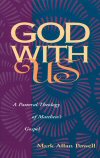
In this creative approach, Mark Allan Powell inquires into the thrust of Matthew’s Gospel in categories related to pastoral theology rather than systematic theology. Fresh insights are gained into the intentions of the evangelist. Included are chapters on Matthew’s understanding of:
- Mission
- Stewardship
- Worship
- Social justice
- Teaching
Powell has rendered a great service to scholars and pastors by interpreting Matthew’s Gospel according to a ‘pastoral’ reading that corresponds in a remarkably satisfying way to the intentions of the Gospel and the situation out of which it was originally addressed. This is the kind of book about which one is tempted to ask, ‘Why hasn’t anyone thought of this before?’
—David R. Bauer, Ralph Waldo Beeson Professor of Inductive Biblical Studies, Asbury Theological Seminary
Mark Allen Powell is the Robert and Phyllis Leatherman Professor of New Testament at Trinity Lutheran Seminary, Columbus, Ohio. He is the author of Fortress Introduction to the Gospels and Introducing the New Testament: A Historical, Literary, and Theological Survey.
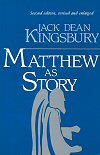
This work uses literary (narrative) criticism to explore the world of the evangelist Matthew. The focus is on the plot of the Gospel story, with discussions of the storylines, Jesus’ speeches and journey, the disciples’ experiences, and the contemporary community.
The book is a completely revised and enlarged version of the first edition. Two chapters have been added: one discussing the speeches of Jesus and one tracing the storyline of the religious leaders. Also, the fifth chapter on Jesus’ use of “the Son of man” has been substantially rewritten to explain more fully and more clearly the meaning and function of this self-designation. Throughout the book, new topics and insights have been added and developed, and the citations and bibliography have been updated.
To know what is going on in contemporary literary-critical interpretation of Matthew’s Gospel, one must read Kingsbury’s Matthew as Story. He has been the trailblazer in this area.
—John P. Meier, William K. Warren Professor of Theology, University of Notre Dame
Jack Dean Kingsbury is the Aubrey Lee Brooks Professor of Theology, emeritus, at Union Theological Seminary in Virginia. He is the author of The Christology of Mark’s Gospel and Conflict in Luke: Jesus, Authorities, Disciples.
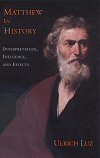
In this provocative book, Ulrich Luz points the way beyond the limitations of the historical-critical method as it has been practiced during the past two centuries. He demonstrates the richness of the insights that can be gained when the interpreter considers a variety of effects and influences that a text has had in subsequent history—a method of inquiry he calls Wirkungsgeschichte.
This distinctive approach is here applied to the Sermon on the Mount, Matthew 10, and Matthew 16:18. Insights from the ancient fathers, from Scholastics, from Reformers and Anabaptists, and from many others are adduced to demonstrate the importance of the history of Christian thought for the interpretation of biblical texts.
Students and pastors will welcome this book! It begins with the frank admission that because much current study of the Bible attempts openly to explain what scriptural texts meant in ancient times, it strikes the reader as irrelevant for life and experience today. Throughout the centuries, however, biblical texts have generated new meanings in new situations. The upshot is that biblical texts have a ‘history of effects,’ and this history is part of our history. Written in a lively style, this book is not only stimulating and highly informative but it also grapples successfully with the knotty problem of what interpreting Scripture entails.
—Jack Dean Kingsbury, Aubrey Lee Brooks Professor of Theology, emeritus, at Union Theological Seminary
Ulrich Luz is a Swiss theologian. He studied theology in Zürich and Göttingen under Hans Conzelmann, Eduard Schweizer, and Gerhard Ebeling, and has taught at the International Christian University in Tokyo (1970–1971), University of Göttingen (1972–1980), and University of Bern (1981–2003). He received honorary degrees from the universities of Leipzig, Budapest, and Sibiu, and served as president of the Societas Novi Testamenti Studiorum in 1998. His published works in English are Jesus in Two Perspectives: A Jewish-Christian Dialog, Matthew 1–7, Matthew in History: Interpretation, Influence and Effects, and The Theology of the Gospel of Matthew.
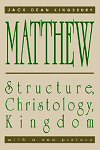
This book attempts a solution to the problems of the structure, Christology, and Kingdom-theology of the Gospel according to St. Matthew. The author contends that the broad structure of the Gospel consists of three main parts: the person of Jesus Messiah, the proclamation of Jesus Messiah, and the suffering, death, and resurrection of Jesus Messiah.
This understanding of the broad structure of Matthew’s Gospel opens the way to a proper understanding of his Christology. That is, for Matthew, Jesus is first and foremost the Messiah, the Son of God. Kingbury’s analysis of the texts in which “Son of God” appears, and of the numerous other Christological terms Matthew employs, confirms this conclusion.
Professor Kingbury demonstrates how Matthew develops both the structure and the primary theological concept of his Gospel, “The Kingdom of Heaven,” around the Christological category of “the Son of God.” A rigorous conclusion reached is that the focus of the Gospel of Matthew is revealed more in his Christology than in his ecclesiology.
Professor Kingsbury has brought to the Gospel of Matthew a fresh glance and a new insight. Without ignoring the heavy backlog of scholarship on this Gospel, he has proposed that redaction criticism restore its focus on Christology which is the heart of Matthew’s message. Amid the wealth of titles of Jesus used by Matthew, Kingsbury argues persuasively that the Evangelist saw Jesus first and foremost as Song of God.
—George MacRae, former dean, Harvard Divinity School
Jack Dean Kingsbury is the Aubrey Lee Brooks Professor of Theology, emeritus, at Union Theological Seminary in Virginia. He is the author of The Christology of Mark’s Gospel and Conflict in Luke: Jesus, Authorities, Disciples.
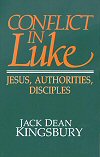
Intertwined with Luke’s story of Jesus are two other story lines: the story of the authorities, who come into conflict with Jesus over the crucial issue of whom God has chosen to rule Israel, and the story of the disciples, who are both loyal and uncomprehending. Kingsbury leads the reader into the dramatic narrative of Luke’s Gospel by tracing and interpreting all three stories. An introductory chapter provides orientation to basic features of literary analysis.
In Conflict in Luke, Jack Dean Kingsbury enables us to hear afresh the story of Luke’s Gospel—a story in which conflict catalyzes development and change. Writing with his usual care and clarity, Kingsbury traces Jesus’ ongoing conflict with the forces of Satan, wtih religious authorities, and even with his own disciples. Kingsbury’s effort magnifies our appreciation of the complexity, beauty, and theological depth of the Third Gospel. His literary-critical approach has born fruit that many readers—especially pastors and students—will find quite delectable.
—Susan R. Garrett, professor of New Testament, Louisville Seminary
Kingsbury follows procedures established long ago by Horace and other ancient critics for examination of a work in terms of the author’s purposeful structuring of themes and narrative material. In the process, he makes a distinctive contribution through his exploration of conflict as an inviting port of entry into Luke’s literary miracle.
—Frederick W. Danker, emeritus professor, Lutheran School of Theology
Jack Dean Kingsbury is emeritus professor of biblical theology at Union Theological Seminary in Virginia.
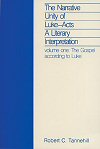
In this volume, Tannehill shows how the narrative contributes to the impact of Luke’s literary whole. The study further shows that Luke’s use of recurring words, patterns of repetition and contrast, irony, pathos, and many other features of this narrative contribute to the total fabric of Luke’s masterpiece.
Tannehill’s main objective . . . is to show how narrative parts contribute to the impact of Luke’s literary whole . . . His study shows how [Luke’s use of recurring words, patterns of repetition and contrast, irony, pathos, and many other features of his narrative] contribute to the total fabric of Luke’s masterpiece.
—Concordia Theological Monthly
The author demonstrates how the repetitions of ideas and formal structures function both to reinforce concepts and to achieve narrative and ideological progression. . . . Tannehill’s approach is quite fruitful. His style is unconvoluted, and the parallels and links he suggests almost never seem contrived or forced.
—Virginia Seminary Journal
Tannehill’s book is of a genre that should . . . challenge the reader, not necessarily to see altogether new things in Luke’s Gospel, but certainly to see old things differently. . . . What is new is the new way in which Tannehill leads the reader into a conversation with different methods, questions, and perspectives. These challenge and provoke the reader to ‘come clean’ with his or her own questions and perspectives.
—Circuit Reader
Tannehill does a fine analysis of narrative plot and characters, in close dialogue and continuity with previous Lucan scholarship. . . . His book is very readable, for he avoids technically literary terms not in wide use by biblical scholars and explains those he does use . . . He stresses not Lucan theology, but how the narrative rhetoric tries to influence readers, so modern readers can have ‘their eyes open to the narrator’s purposes and to the crucial life issues involved.’ His narrative approach brings new insights to old debates.
—The Catholic Biblical Quarterly
Robert C. Tannehill is Fred Gealy Professor Emeritus of New Testament at the Methodist Theological School in Delaware, Ohio.
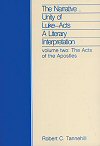
This volume demonstrates how the repetitions of ideas and formal structures function both to reinforce concepts and to achieve ideological progression.
In this ‘new kind of commentary,’ Tannehill eschews discussion of the historical questions that interpreters of Acts have regarded as central. . . . Acts is studied as a story that uses particular literary techniques to influence its readers. . . . The work will stand alongside more traditional commentaries on Acts for many years to come. It will be of great value to scholars, pastors, and students alike.
—Journal of Biblical Literature
This volume follows plot order with attention to a wide range of narrative dynamics . . . These different perspectives provide some fresh views of Acts not readily available in standard historical-critical commentaries. . . . With its companion first volume, it must be consulted for any serious narrative study of Luke-Acts.
—Catholic Biblical Quarterly
[This] is a successful study of Luke-Acts that will stimulate imaginative readings to a greater degree than ordinary commentaries, and a suggestive example of how future commentaries might be written. . . . The breadth of his reading, the clarity of his prose, and the depth of his insight mark this new commentary as a singular contribution.
—Theological Studies
Deciphering the Lukan narrative rhetoric, Robert Tannehill has achieved a quantum leap beyond traditional exposition on Luke-Acts. . . . His two volumes deserve to be read start to finish. . . . This is a commentary for serious scholar, serious pastor, and serious seminarian.
—Theology Today
Robert C. Tannehill is Fred Gealy Professor Emeritus of New Testament at the Methodist Theological School in Delaware, Ohio.
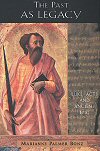
This study addresses the genre and interpretation of Luke-Acts in the light of its contemporary social, literary, and ideological milieu, particularly as these elements are reflected in the Latin epics contemporary with Luke-Acts and in their famous Augustan prototype, Virgil’s Aeneid. Literary evidence indicating that Virgil’s works had been translated into Greek prose by the middle of the first century makes this line of inquiry especially promising. Interpreting Luke-Acts as a prose adaptation of heroic or historical epic provides a hermeneutical model that is both universal in its theological message and essentially popular in its narrative presentation.
Beginning with the question of literary occasion, Bonz introduces the particular configuration of historical circumstances that produced the great foundational epics of Gilgamesh, the
This significant book by Marianne Palmer Bonz seeks to answer the scholarly debate regarding the literary genre of Luke-Acts. . . . Bonz’s study is convincing. . . . Careful readers can gain valuable insights into Luke-Acts by focusing on Chapter 4, ‘The Dramatic Unfolding of Prophecy and History in Luke-Acts,’ and Chapter 5, ‘Luke-Acts Reconsidered,’ in which she surveys the major sections of both volumes for their stylistic features and dramatic movement. Pastors have much to learn from Bonz regarding the character and scope of Luke’s historical and theological vision.
—James L. Bailey, emeritus professor of New Testament, Wartburg Theological Seminary
Bonz has shown that, whatever Luke’s own intentions may have been, his first readers and hearers would have been well prepared to receive his words as those of an epic with cosmic significance. Beyond this, she has argued plausibly and with great detail that being read and understood as ‘epic’ was precisely Luke’s intention. I found myself convinced by Bonz’s description of the role played by such features as extensive use of repetitions and parallelism—along with ambiguity and reversal—in the epic tradition that Luke intentionally adapted as the genre for his rhetorical strategy. Bonz synthesizes a convincing rhetorical and social setting for reading Luke-Acts. I am strongly persuaded by her evidence and arguments.
—S. Scott Bartchy, professor of Christian origins and the history of religion, University of California
Marianne Palmer Bonz is the managing editor of Harvard Theological Review and holds a doctorate in New Testament from Harvard Divinity School.
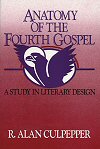
This book is an attempt to make some initial tracing of what the Gospel looks like through the lens of “secular” literary criticism. As an interdisciplinary study, the work is an effort to contribute to that dialogue by studying the narrative elements of the Fourth Gospel while interacting occasionally with current Johannine research. It is intended not as a challenge to historical criticism or the results of previous research but as an alternative by means of which new data may be collected and readers may be helped to read the Gospel more perceptively by looking at its certain features. This process is to be distinguished from reading the Gospel looking for particular kinds of historical evidence.
The aim is to contribute to understanding the Gospel as a narrative text, what it is, and how it works. The emphasis will be upon the construction of hypotheses or critique of methods, the Gospel as it stands rather than its sources, historical background, or themes is the subject of this study.
Careful study of this book would provide an excellent beginning to an exegetical course on John. At the same time, it should also provide a valuable resource for those who teach John in classics, philosophy, or English courses.
—Pheme Perkins, professor, Boston College
This ‘anatomy’ will be an important tool for Johannine research for many years. . . . Future Johannine studies can only build upon the impressive synthesis of critical and interpretative perspectives Culpepper has constructed.
—William G. Doty, emeritus professor, Department of Religious Studies, The University of Alabama
Culpepper’s Anatomy is one of the most significant applications of literary criticism to the Bible. It not only provides a fresh, reliable literary study of the Gospel according to John (something no prior work has done) but also establishes responsible norms for future interpretation of biblical texts from literary perspectives.
—Marion L. Soards, professor of New Testament studies, Louisville Seminary
R. Alan Culpepper is dean at the McAfee School of Theology, Atlanta, and one of the leaders in Gospel of John research.
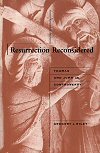
This study centers on a protracted debate within early Christianity concerning a foundational aspect of the Gospel of Thomas and its related literature: the concept of the body and resurrection. It traces the background of this idea in the Semitic and Greco-Roman world, and its expression in the Thomas literature as a whole: the Gospel of Thomas, Book of Thomas, and Acts of Thomas. But the inspiration for the study, and its main focus, is the controversy between the two closely related Christian communities of Thomas and John, between the Gospel of Thomas and the Gospel of John, on the issue of resurrection, expressed in John most clearly in the story of Doubting Thomas.
Gregory Riley’s reconsideration of the concepts of resurrection and afterlife in the Greco-Roman world is brilliant and convincing. This will become a standard for all future discussion of the resurrection of Jesus in early Christian sources. On the basis of these new insights, the debates between the communities of John and Thomas become a fascinating study in the early controversies of the followers of Jesus. The author’s comprehensive knowledge of texts from the ancient world, his admirable exegetical skills, and his philological expertise in dealing with Coptic-Gnostic writings lead to results that few others are able to achieve.
—Helmut Koester, Morison Research Professor of Divinity, Harvard Divinity School
This book is sharply focused, patiently argued, and strongly supported by extensive documentation and an exhaustive bibliography. Against the background of scholarly preoccupation with the relationship of the Gospel of Thomas to the Synoptic gospels, it creates the occasion for fresh debate on the relationship of Thomas to John.
—Jack Dean Kingsbury, emeritus professor, Union Presbyterian Seminary, Richmond, Virginia
In this important work Gregory Riley sheds new light on the Gospel of John and Thomas and their interrelationships and carries the study of ‘Thomas Christianity’ forward to include other ancient Thomas texts. Riley’s mastery of the ancient sources is truly impressive, as is his insightful and untrammeled exegesis of well-known texts. His book is an original and exciting piece of scholarship.
—Birger A. Pearson, emeritus professor of religious studies, University of California, Santa Barbara
Gregory J. Riley is professor of Religion at the Claremont Graduate University’s School of Religion.
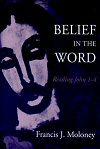
Although studies have appeared on current narrative and reading approaches to John’s Gospel, no commentary is available that integrates their findings for students and scholars. Professor Moloney has met this need with a pioneering commentary that focuses on the text itself and its impact on the reader.
A trailblazer. . . . this innovative book applies the insights of narrative criticism to the talent of commentary writing . . . Adopting the perspective of a first-time reader, Moloney traces the way in which the narrative shapes the role of the implied reader, all the while maneuvering the real reader along the path toward authentic faith.
—R. Alan Culpepper, dean, James and Carolyn McAfee School of Theology, Baylor University
Moloney provides us with the first thorough literary commentary on John 1–4 that uses a reader response method. He leads us through the Gospel’s narrative and enables us to appreciate it from the inside without disregarding the original historical setting of the writing. This book will be widely read and appreciated in future work on the Fourth Gospel.
—Robert Kysar, emeritus professor of preaching and New Testament, Candler School of Theology, Emory University
Francis J. Moloney is a senior professorial fellow of Australian Catholic University at its Melbourne campus, Australia, and member of the Department of Biblical Studies. He is also the former provincial superior of the Salesians of Don Bosco for Australia and the Pacific region and former Katharine Drexel Professor of Religious Studies and dean of the School of Theology at the Catholic University of America. Moloney is a fellow of the Australian Academy of the Humanities, a member of the Order of Australia, and the author of more than 40 books.
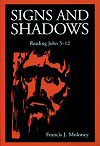
Moloney offers a close reading of the crucial middle-section of the Gospel of John, taking the reader on a journey as Jesus’ ministry unfolds. Among events dealt with are Jesus’ walk on the Sea of Galilee, the description of the Good Shepherd, and the resurrection of Lazarus. The present volume represents the continuation of Moloney’s ongoing narrative commentary on the Gospel, a sequel to his earlier Belief in the Word, which focused on chapters one through four.
This book will be a useful resource for any reader who wants to attend carefully to the narrative details of John’s Gospel.
—Gail R. O’Day, senior associate dean, Candler School of Theology, Emory University
In terms of length and detail, there is simply nothing like it in Johannine studies. Such a commentary has been very much needed for quite some time now, and Moloney has obliged with a splendid example of what narrative criticism can do. First-rate and refreshingly up-to-date.
—Fernando F. Segovia, Oberlin Graduate Professor of New Testament and Early Christianity, Vanderbilt University
Francis J. Moloney is a senior professorial fellow of Australian Catholic University at its Melbourne campus, Australia, and member of the Department of Biblical Studies. He is also the former provincial superior of the Salesians of Don Bosco for Australia and the Pacific region and former Katharine Drexel Professor of Religious Studies and dean of the School of Theology at the Catholic University of America. Moloney is a fellow of the Australian Academy of the Humanities, a member of the Order of Australia, and the author of more than 40 books.
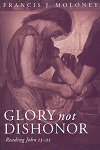
Moloney’s literary-historical commentary offers a close reading of the final section of the Gospel of John, taking the reader on a journey through Jesus’ final night and his ministry’s climax in passion, death, and resurrection. Concluding his unique trilogy, Moloney shows how the reader is led on a journey of faith by the Gospel writer, culminating in the belief in Jesus the Christ and having life in his name, despite his absence.
Francis J. Moloney is a senior professorial fellow of Australian Catholic University at its Melbourne campus, Australia, and member of the Department of Biblical Studies. He is also the former provincial superior of the Salesians of Don Bosco for Australia and the Pacific region and former Katharine Drexel Professor of Religious Studies and dean of the School of Theology at the Catholic University of America. Moloney is a fellow of the Australian Academy of the Humanities, a member of the Order of Australia, and the author of more than 40 books.
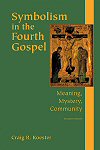
Craig Koester’s respected study uses the symbolic language of the Gospel of John as a focus to explore “the Gospel’s literary dimensions, social and historical context, and theological import.” This edition is fully revised and updated and includes a number of new sections on such topics as Judas and the knowledge of God. Fresh treatments are given on a number of issues, including the Gospel’s Christology. This new edition offers both new insights and proven worth for students and scholars alike.
John’s use of symbols is an essential key to understanding the Gospel . . . Craig Koester’s book is an admirable and important contribution in the extent of its coverage, the quality of its judgment, and the appreciation both of the scholarly and religious implications of the Fourth Gospel’s symbolism. A first-rate book well worthy of our attention.
—Raymond E. Brown, emeritus professor, Union Theological Seminary, New York
I have been enriched by Koester’s detailed scholarship and beautifully written text.
—Catholic Biblical Quarterly
The present fresh and welcome survey deserves to become a leading marker in Johannine studies for all present and future students of this symbolic, but also incarnational, Gospel.
—Theology
Craig R. Koester is professor and Asher O. and Carrie Nasby Chair of New Testament at Luther Seminary in St Paul, Minnesota. He received his PhD in New Testament from Union Theological Seminary in New York.
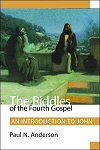
Paul Anderson, a leading scholar of the Fourth Gospel, provides an introductory textbook, crafted for a semester course, which leads students through literary, historical, and theological aspects of the Fourth Gospel’s most vexing puzzles. Traditional, historical-critical, and literary-critical approaches are deftly introduced and their limitations evaluated; questions of the Gospel’s authorship, composition, relationship to the Synoptics, and origins in particular historical experiences are succinctly addressed; and distinctive Johannine perspectives on Jesus, the church, and the world are discussed.
I love this book, which now constitutes the intro volume for serious students of the Fourth Gospel! I can’t think of any question that Anderson has not raised and addressed, with his typical acuity and thoroughness. For scholarly and popular readers alike, this is now the ‘go–to’ book for those undertaking a study of this powerful Gospel.
—Jaime Clark–Soles, associate professor of New Testament, Perkins School of Theology, Southern Methodist University
This is the most comprehensive introductory textbook yet for courses on the Gospel of John. Paul Anderson crisply summarizes the theological, historical, and literary issues posed by the Gospel and develops a ‘bi–optic’ approach that takes ‘both–and’ rather than ‘either–or’ solutions to long–standing debates in Johannine scholarship. It is going to be fun to watch classes awaken to this intriguing Gospel while this introduction poses one ‘riddle’ after another for them.
—R. Alan Culpepper, dean, McAfee School of Theology, Mercer University
John’s Gospel invites readers into a dialogue that can last a lifetime. In this engaging introduction, Paul Anderson explores some of the most important aspects of the Fourth Gospel. By asking questions of its theology, historical character, and literary quality, he offers a welcome treatment of the Gospel that helps contemporary readers encounter it in a multidimensional way.
—Craig Koester, professor and Asher O. and Carrie Nasby Chair of New Testament at Luther Seminary, St. Paul, Minnesota
One of the most helpful introductions to most of the key academic discussions of the Fourth Gospel, this well–designed and easy–to–follow work is ideal for classroom use. Anderson is cognizant of and respectful toward the wide range of diverse approaches, holds in wise tension complementary streams of evidence within the Fourth Gospel and early Christianity, and offers his own insightful contributions for Johannine studies.
—Craig Keener, professor of New Testament, Asbury Theological Seminary
Paul N. Anderson is professor of biblical and Quaker studies at George Fox University and author of The Fourth Gospel and the Quest for Jesus: Modern Foundations Reconsidered and
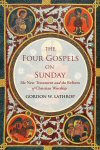
Premier liturgical theologian Gordon Lathrop argues that far too often liturgy, preaching, and liturgical theology are informed by naïve and outdated exegesis. In a fully original and deeply reflective work, Lathrop collaborates with newer biblical studies to see the Gospels anew. He treats the Gospels as early witnesses to the meaning of Christian assembly and forces in the shaping and reshaping of liturgy.
Lathrop first probes each Gospel historically and exegetically to discern what it tells us about early Christian worship and Christians’ relationship to the Risen One. Then Lathrop treats the Gospels together to draw out more of their contemporary importance, especially ways in which they can enrich our reflection about the assembly itself, ministry, baptism, the use of Scripture in liturgy, and unity within ecumenical diversity.
Taking seriously the origins of the New Testament, as we understand them today, Lathrop demonstrates that the Gospels can remain a true catalyst for liturgical theology and liturgical renewal, as well as an inspiring link to the faith and convictions of the earliest followers of the Christian way.
Gordon Lathrop imaginatively traces how the Gospels interacted with, and attempted to shape, early Christian assemblies and then draws suggestive implications for contemporary practice. Informed and insightful, his synthesis of Scripture and liturgical theology will be valuable for anyone who reads Scripture and leads worship today.
—Harold Attridge, dean, Yale Divinity School
Worship leaders who use the Revised Common Lectionary will welcome Gordon Lathrop’s latest contribution. He takes the differences of the four Gospels seriously as guides to effective proclamation and liturgical leadership. Lathrop bridges the gap between responsible biblical scholarship and celebrations of the meal.
—Ralph W. Klein, Christ Seminary-Seminex Professor Emeritus of Old Testament, Lutheran School of Theology at Chicago
Gordon Lathrop has juxtaposed two of his loves in this volume: the Gospels and the Christian assembly. He reminds us that the Gospels were addressed to local Christian assemblies and were read in actual assemblies gathered for word and meal. Lathrop makes a compelling case that biblical and liturgical scholars need to pay attention to each other’s work and that preachers need to pay attention to the assembly as the context of the Gospel texts. This lovingly crafted book will be of interest to scholars but also to the members of the assembly who continue to acclaim, hear, and celebrate the gospels in their liturgies of word and meal.
—Frank C. Senn, pastor, Immanuel Lutheran Church, Evanston, Illinois
Gordon W. Lathrop is a visiting professor of liturgical studies at Yale and the Emeritus Charles A. Schieren Professor of Liturgy at the Lutheran Theological Seminary at Philadelphia. He is the author of many books, including the trilogy Holy Things, Holy People, and Holy Ground. His most recent work is The Pastor: A Spirituality.
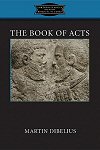
This volume brings together some of Dibelius’ most important work. While he is especially renowned for his commentaries, Dibelius was on the forefront of literary analysis, the relationship of theology to literary artistry, and the importance of contemporary Greco-Roman history for the analysis of the Book of Acts. As an aid to students, each essay has been supplemented with additional notes and bibliography to show where the discussion has continued since Dibelius. This will provide an excellent supplementary textbook for courses on the New Testament or the Bible.
This new edition, edited by K. C. Hanson, contains up-to-date notes pertaining to each essay. These notes contain updated footnotes and resourceful and pertinent bibliographies. . . . the wonderful appendices with bibliographies and listings of German and translated works of Dibelius, along with lists of abbreviations and the like, are the work of an accomplished editor. This volume holds a proud place among the classics and is a must read for the student of Acts and the student of the history of New Testament interpretation.
—Society of Biblical Literature
Martin Dibelius (1883–1947) was professor of New Testament at the University of Heidelberg, Germany, and one of the most important biblical scholars of the twentieth century. Among his many publications in English are From Tradition to Gospel, The Sermon on the Mount, Paul, and The Pastoral Epistles (Hermeneia).
K. C. Hanson has taught biblical studies at Episcopal Theological School and the School of Theology at Claremont, Creighton University, and St. Olaf College. His published works include Palestine in the Time of Jesus: Social Structures and Social Conflicts.
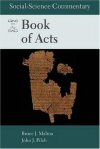
Like earlier volumes in the Social Science Commentary series, this volume situates Acts squarely in the cultural matrix of the first century Mediterranean world, elaborating its codes of patron and client, mediatorship, honor and shame, healing and sickening, wizardry and witchcraft accusations, and the understanding of the Spirit of God as well as deities and demons as personal causes of significant events.
Bruce J. Malina is professor of New Testament at Creighton University, Omaha, Nebraska.
John J. Pilch is professor of biblical studies at Georgetown University, Washington, DC.
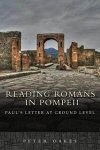
Peter Oakes relies on demographic information and data from excavations in nearby Pompeii to paint a compelling portrait of daily life in a typical insula, or apartment complex, like the ones in which Paul’s audience in Rome likely lived. Imaginatively fleshing out profiles of the circumstances of actual residents of Pompeii, Oakes then uses these profiles to invite the reader into a new way to hear Paul’s letter to the Romans as the apostle’s contemporaries might have heard it. The result of this ground-breaking study is a fuller, richer appreciation of Paul’s most important letter.
Peter Oakes is Greenwood Senior Lecturer in New Testament at the University of Manchester.
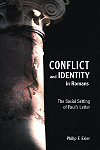
What is the purpose of Paul’s letter to the Romans? Esler provides an illuminating analysis of this epistle, employing social-scientific methods along with epigraphy and archaeology. His conclusion is that the Apostle Paul was attempting to facilitate the resolution of intergroup conflict among the Christ-followers of Rome, especially between Judeans and non-Judeans, and to establish a new identity for them by developing a form of group categorization that subsumes the various groups into a new entity.
Esler provides his readers with a discerning, exciting, and masterful reading of St. Paul’s letter to the Romans. . . . For an incisive, penetrating, and sensible grasp of Romans, there is nothing better than Esler’s work. The unassuming and unostentatious style in which the book is written belies the freshness of insight and brilliance of perception that the author offers his readers.
—Bruce J. Malina, professor of New Testament and early Christianity, Creighton University
This is an important study of Paul’s letter to Rome that breaks out of the traditional boundaries of doctrine interpretation. Employing insights from recent social science, Esler argues that Paul offers the diverse churches in Rome a common in-group identity that could overcome their ethnic conflicts and make cooperation possible. They need to understand that every ethnic group stands equally under sin and under grace. This innovative book makes Romans more important than ever for a world still torn by ethnic conflict.
—Robert Jewett, visiting professor of New Testament, University of Heidelberg
Philip F. Esler is professor of biblical criticism at the University of St. Andrews, Scotland. Among his publications are The Early Christian World, Galatians, and The Early Christians and Their Social Worlds.
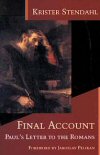
Krister Stendahl offers a provocative and compelling reading of Paul’s letter to the Romans, the “final account” of the major themes of Paul’s theology. Among these are the conceptual underpinnings of Paul’s mission, the grand divine plan for the mending of creation, the redemption of Israel, the mystery of the inclusion of the Gentiles, and the relation of the “macro” to the “micro” in Paul’s thought—and much more.
The book is delightful reading, punctuated with humor, yet serious about expounding long-standing traditional interpretations of Paul and of Romans that fly in the face of the text and the spirit of Paul’s intentions.
—Journal of Beliefs and Values
Krister Stendahl (1921–2008) was Andrew W. Mellon Professor of Divinity Emeritus and former dean at Harvard Divinity School, and bishop emeritus of Stockholm. Among his many writings is Paul among Jews and Gentiles.
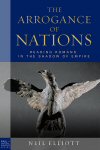
Elliott offers a fresh and surprising reinterpretation of Paul’s letter to the Romans in the context of Roman imperial ideology, bringing to the text the latest insights from classical studies, rhetorical criticism, postcolonial criticism, and people’s history.
By setting the letter alongside Roman texts (Cicero, Virgil, the Res Gestae of Augustus, Seneca, poets from the age of Nero, as well as later historians and satirists), Elliott provides a dramatic new reading of the letter as Paul’s confrontation with the arrogance of empire—and with an emerging Christianity already tempted by the seductive ideology of imperial power. The Arrogance of Nations explores such topics as:
- Empire and the obedience of faith
- Justice and the arrogance of nations
- Mercy and the prerogatives of power
- Piety and the scandal of an irreligious race
- Virtue and the fortunes of peoples
- Paul and the horizon of the possible
Neil Elliott, an Episcopal priest, teaches biblical studies at United Theological Seminary of the Twin Cities and Metropolitan State University in Minneapolis.
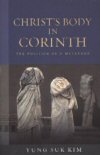
Yung Suk Kim takes up the language of “body” that infuses 1 Corinthians, Paul’s most complicated letter, and the letter that provides us the most information, and poses the sharpest questions, about social realities in the early church. Kim argues against the view that in speaking of the church as Christ’s body Paul seeks to emphasize unity and the social boundary. Against the conventional rhetoric of the “body politic” in Greco-Roman philosophy, Kim argues that Paul seeks rather to nourish the vitality of a diverse community and to criticize the ideology of a powerful in-group in Corinth, a message of particular importance for contemporary global Christianity.
Yung Suk Kim is assistant professor of New Testament and early Christianity at Samuel DeWitt Proctor School of Theology, Virginia Union University, in Richmond, Virginia.
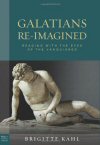
Brigitte Kahl brings to this insightful reading of Galatians a deep knowledge of the classical world and especially of Roman imperial ideology. The first wave of scholarship on the Roman imperial context of Paul’s letters raised important questions that only thorough treatments of individual letters can answer. Kahl sets the letter to the Galatians in the context of Roman perceptions of vanquished peoples as represented in the Great Altar at Pergamum. Beginning with a perceptive discussion of the Great Altar, Kahl describes imperial representations of Roman power as well as the characteristics officially imputed to conquered peoples, including the “savage” Galatians (Gauls).
Brigitte Kahl is professor of New Testament at Union Theological Seminary, New York.
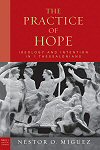
Although the political interpretation of Paul is still considered something of a novelty in North America and Europe, it is well established in Latin America and among theologians of liberation. In The Practice of Hope, Néstor O. Míguez brings the insights of historical-critical study and political analysis together with incisive theological reflection. Taking on European philosophical interpretations of Paul, the “North Atlantic consensus” regarding social stratification in the Pauline churches, and the distortions of “rapture” theology, Míguez situates Paul’s mission in the political context of Roman Thessalonica and reads his first letter in engagement with Latin American realities. The result is a surprising rediscovery of Paul as an organic intellectual for whom hope is always a socially concrete reality.
Néstor O. Míguez is professor of Bible at the Instituto Universitario ISEDET in Buenos Aires and the author of numerous books and articles on the theological and political interpretation of the New Testament, including Juan de Patmos: El Visionario y Su Visión, El Jesús del Pueblo, and with his father José Míguez Bonino, That You May Have Life: Encounters with Jesus in the Gospel of John.
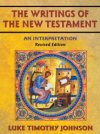
The Writings of the New Testament
- Author: Luke Timothy Johnson and Todd C. Penner
- Publisher: Fortress Press
- Publication Date: 2002
- Pages: 694
This book is “for those who want to understand the origin and shape of the New Testament writings but are unable to find a comprehensive introduction that is neither repellingly technical nor appallingly trivial,” (from the Preface of the First Edition). This is a completely revised and updated version of Johnson’s very successful introduction to the New Testament (1999). Johnson organizes his presentation in six major sections:
- The Symbolic World of the New Testament
- The Christian Experience
- The Synoptic Tradition
- Pauline Traditions
- Other Canonical Witnesses
- The Johannine Tradition
Luke Timothy Johnson the author of the Introduction, Commentary, and Reflections on the Letter of James, is Robert W. Woodruff Professor of New Testament and Christian Origins at the Candler School of Theology, Emory University, Atlanta, Georgia. His works include The Real Jesus: The Misguided Quest for the Historical Jesus and the Trust of the Traditional Gospels and The Letter of James, in the Anchor Yale Bible.
Todd C. Penner is the Assistant Professor of Religion at Austin College and the co-editor with Caroline Vander Stichele of Contextualizing Acts: Lukan Narrative and Greco-Roman Discourse.
This book will download as two resources.
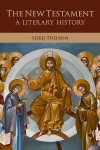
Gerd Theissen takes up the problems of the New Testament writings’ emergence and the canon’s formation out of the wide variety of early Christian literature. Drawing on Max Weber’s discussion of the evolution of religious movements, Theissen correlates waves of developing early Christian literature with a series of phases in the life of the movement: the charismatic phase (the roles Jesus and the apostle Paul played as the “twofold beginning” of Christian literature), the pseudepigraphic phase (referring to the “fictive self-interpretation” of each of those figures), the functional phase, in which other independent forms developed, and the canonical phase, as the New Testament took shape as the literature of a world religion.
Writing with his usual verve and clarity, Gerd Theissen gives us a fresh perspective on the history of the development of the New Testament and its establishment as canon. This is a literary history and more. Theissen attends to the genres and sub-genres of the two basic forms of literature in the Jesus movement, gospels and letters, related to the two chief ‘charismatics,’ Jesus and Paul; to the subsequent ‘fictive self-interpretations’ of these two founding figures; and to the basic phases of historical development marked by continuous crossing of class and cultural boundaries. This literary-critical history of the New Testament joins the ranks of Herder, Overbeck, Baltman, Dibelius, and Schmidt as another milestone of research on the origin and development of the New Testament and early Christian literature.
—John H. Elliot, emeritus professor, University of San Francisco
Gerd Theissen is a professor of New Testament at the University of Heidelberg, Germany, and the author of The Religion of the Earliest Churches and The Shadow of the Galilean. He is a coauthor of The Historical Jesus: A Comprehensive Guide and coeditor of The Social Setting of Jesus and the Gospels.
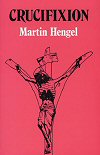
In a comprehensive and detailed survey on its remarkably widespread employment in the Roman empire, Dr. Hengel examines the way in which “the most vile death of the cross” was regarded in the Greek-speaking world and particularly in Roman-occupied Palestine.
His conclusions bring out more starkly than ever the offensiveness of the Christian message: Jesus not only died an unspeakably cruel death, he underwent the most contemptible abasement that could be imagined. So repugnant was the gruesome reality, that a natural tendency prevails to blunt, remove, or domesticate its scandalous impact. Yet any discussion of a “theology of the cross” must be preceded by adequate comprehension of both the nature and extent of this scandal.
The book is rewarding both for the extensive amount of historical information about crucifixion which is provided and for an appreciation of the stigma which would have been attached to this punishment.
—Religious Studies Review
The author’s formidable survey of the classical literature gives new eloquence to Origen’s description of crucifixion as mors turpissima (more vile death), or to Paul’s preaching of the ‘scandal of the Cross.’
—The Bible Today
This valuable book deserves a wide circulation. It is worth reading and rereading. Its implications within the theological framework and message of the New Testament need to be most carefully thought through and meditated on.
—Concordia Journal
One can probably find more about crucifixion in this book than anywhere else. . . . Teachers and ministers will not want to deal with the crucifixion of Christ again without first reading Hengel.
—Christianity Today
Martin Hengel is emeritus professor of New Testament and early Judaism at the University of Tübingen, Germany. Among his many important books are Judaism and Hellenism, Between Jesus and Paul, The Atonement, and Property and Riches in the Early Church.
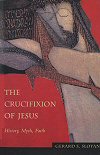
Jesus of Nazareth died on a cross at the hands of Roman justice around the year 30 AD. Thousands of others perished in the same way, and many people before and since have suffered far more gruesome torments. Why then is Jesus, Gerard Sloyan asks, uniquely and universally remembered for his suffering death? How has his death brought solace to many millions?
To answer this question, Gerard Sloyan in this powerful historical tour de force tracks the legacy of the cross across two millennia of Christian reminiscences, piety, art, speculation, and mythicizing. Beginning with New Testament accounts, he shows how Jesus’ death came to be seen as sacrificial. He then plots the emergence and development—in theology, liturgy, literature, art—of the conviction that Jesus’ death was redemptive, as seen both in soteriological theory from Tertullian to Anselm, in the Reformation and modern eras, and in more popular religious responses to the crucifixion.
Sloyan’s impressive scholarship and keen theological insights bring to light both the historical realities of Jesus’ death and the many and profound ways in which the cross has been received in the hearts and minds of those who profess Jesus’ name.
Gerard S. Sloyan is emeritus professor of religion at Temple University and visiting professor of religion and religious education at Catholic University of America, Washington, DC. He is the author of numerous books, including Why Jesus Died and Preaching from the Lectionary: An Exegetical Commentary.
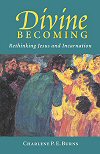
Despite the feverish pace of publishing in historical Jesus studies, biblical scholars and theologians have not notably progressed in addressing the meaning and significance of the figure of Jesus in ways credible for contemporary persons.
In this creative and insightful work, Burns seeks to understand the significance of Jesus and his incarnation through the category of participation. The central theological claims in the traditional concept of incarnation are anchored and illumined by Jesus’ particular ability for empathy, sympathy, attunement, and entrainment. This notion, derived from the psychological research of Daniel Stern, allows Burns to show that incarnation—the capacity to participate in the life of others—is present not only in Jesus but to some extent in all people and in all religions. It further illumines features of God’s Trinitarian life and our lifelong journey into God (deification).
What Charlene Burns attempts to answer in Divine Becoming is surely one of the knottiest contemporary Christological puzzles: how can orthodox Christology be understood, that is, made persuasive, really internalized, deeply appropriated? She does so by a creative and credible use of psychological analysis (of empathy and sympathy), showing that God and the human belong together, not only in Jesus, but in all of us. This book will be, I believe, at the center of future Christological discussion.
—Sallie McFague, Emerita Carpenter Professor, Vanderbilt University
Divine Becoming is a beautifully articulated and carefully reasoned book, conversant with the classical theological tradition. Charlene Burns creatively incorporates interdisciplinary research into the human phenomena of entrainment, attunement, and altruism to interpret the meaning of incarnation. Where divine empathy meets the human capacity for self-transcendence on behalf of others, there deification occurs like unto Jesus.
—Craig L. Nessan, academic dean and professor of contextual theology, Wartburg Theological Seminary
Charlene P. E. Burns is professor of religious studies at the University of Wisconsin-Eau Claire.
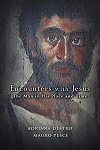
What was there in Jesus’ person, behavior, and words that prompted not only much enthusiasm but also much hostility? This compelling portrait of the man Jesus of Nazareth by two pioneers of the anthropological study of early Christianity answers this vital question. They bring the fruit of years of scholarship to bear on a radical figure in Roman Galilee and on his encounters with others and the movement those encounters inspired. They give close attention to the everyday realities that shaped those encounters: the facts of travel, common meals, domestic space, and the interactions of bodies. The result is a refreshing new look at the man who proved so significant-and so controversial-in Western culture.
Recent scholarship has provided numerous works that have opened up the discussion of the historical Jesus in fresh ways. In this exciting new work on Jesus, Destro and Pesce collaborate to investigate Jesus in terms of ‘lifestyle’ or ‘existential praxis’—that is, by examining Jesus’ habitual actions that reveal the depths of his personality and intentions. They do this by looking at the concrete realities of Jesus’ relationships—not only to other people, but to the land as well. They explore his commensality, his emotions, and his body in ways that bring new focus to old questions. Every reader will be rewarded by engaging the work of these two veteran interpreters.
—K.C. Hanson, editor in chief, Wipf and Stock
Adriana Destro is a professor of cultural anthropology at the University of Bologna and the author of numerous books on anthropology and the anthropological study of religion.
Mauro Pesce is the professor of the history of Christianity at the University of Bologna and author of numerous books in New Testament studies.
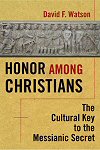
Readers have long puzzled over peculiar aspects of the Gospel of Mark: Jesus’ attempts to conceal his deeds and his identity. William Wrede called these and similar motifs the “messianic secret” in Mark, and proposed that Mark had invented the “secret” to explain why the announcement of the arrival of the Son of God had not taken the world by storm. Other scholars have disagreed: perhaps Mark meant to highlight Jesus’ divinity (after all, Jesus usually doesn’t succeed in keeping himself hidden!) or perhaps Mark wanted to tie Jesus’ identity to his destiny on the cross as a warning to disciples that they may face persecution. Or, some have proposed, there simply is no single explanation for all of Jesus’ bewildering behaviors in the Gospel.
David F. Watson brings a new perspective to the “messianic secret,” relying not on the Christological concerns of nineteenth- and twentieth-century theologians, but on recent insights into the role of honor and shame in ancient Mediterranean culture on the part of social scientists. Mark’s portrayal of Jesus simultaneously shows his ability to provide favors and benefits to others and his refusal to put himself forward or draw attention to himself as a benefactor, thereby teaching that in God’s kingdom it is not the great and powerful who are most highly regarded, but the humble. Mark’s depiction of Jesus is part of a larger effort to promote a radically different understanding of honor within the family of faith.
Taking up and refining insights from recent social–scientific exegetical research on secrecy in the Ancient Mediterranean world, Watson convincingly demonstrates that Wrede’s messianic secret hypotheses is entirely culturally implausible. Concealment passages in Mark primarily reflect the day–to–day concerns about honor and shame among early believers who would have understood the Gospel to be addressing these issues.
—John J. Pilch, visiting professor, Georgetown University
David Watson has written a scholarly and very useful monograph. His soundings into the roles of secrecy in the ancient Mediterranean would further illustrate the value of anthropological history. Perhaps now Wrede’s understanding of the ‘messianic secret’ in Mark may finally be laid to rest.
—Bruce J. Malina, professor of New Testament and early Christianity, Creighton University
Honor among Christians evinces perhaps the most thorough deployment of cultural anthropology for understanding Mark’s Gospel that I know, and one of the most sophisticated. Watson convincingly argues that Wrede’s durable prism of ‘the messianic secret’ has occluded our exegetical vision, which may be corrected by adopting lenses more appropriate to Mark’s own social world. The text, not a method, remains focal in Watson’s analysis, which opens rather than shuts down a broad range of productive conversation with other interpretive approaches. This is a work of genuine importance, chiefly because it illumines how subversive the Second Gospel was in its own place and time—and remains so in our own.
—C. Clifton Black, Otto A. Piper Professor of Biblical Theology, Princeton Theological Seminary
David F. Watson is associate professor of New Testament and academic dean for academic affairs at United Theological Seminary, Dayton, Ohio. He has contributed to New Proclamation, Lectionary Homiletics, and the Wesley Study Bible.
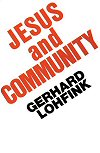
Gerhard Lohfink calls the present-day church to once again be the “contrast society,” which attracts non-believers by living what it preaches and by being different without being narrowly sectarian.
Gerhard Lohfink is a German Catholic priest and theologian. He was Ordinarious Professor for the New Testament on the Catholic Theological Faculty at the University of Tübingen in Germany from 1976–1986.
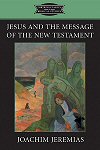
Joachim Jeremias was one of the most innovative and productive New Testament scholars of the twentieth century. This volume brings together some of his best-known works on historical Jesus research and core issues concerning Gospel tradition.
Joachim Jeremias was the acknowledged twentieth-century specialist on the Semitic language of the Jesus traditions. His work on Jesus’ parables, prayers, and Eucharistic words, as well as Jesus’ social contexts, are still much consulted. The shorter essays collected here are excellent distillations of his key ideas. They are models of simplicity and clarity and deserve to be read and re-read by scholar and student alike.
—Dennis Duling, emeritus professor, Canisius College
Joachim Jeremias (1900–1979) was a German Lutheran theologian. He was a scholar in Near Eastern studies and professor of New Testament at the University of Goettingen, Germany. He is author of several books, including Jerusalem in the Time of Jesus.
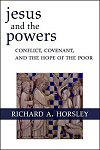
Refusing a false dichotomy between “politics” and “religion” in Jesus’ world (and our own), Jesus and the Powers rediscovers Jesus’ response to the imperial power of his day. Richard A. Horsley describes the relevance of political realities under great empires for understanding the rise of covenantal theology and apocalyptic vision in Israel’s history. Then he explores aspects of Jesus’ activity in the context of the Roman Empire. Horsley examines Jesus as an exorcist and prophetic figure and the character of his death by crucifixion. He also shows how the community life in the early Pauline assemblies gave form to a new response to imperial powers—and stimulus to contemporary readers to re-imagine their own response to political realities in our own day.
Horsley brings together the theme of the restoration of the people of God with the transformation of the Powers in an illuminating and accessible style. The implications of the teaching and acts of Jesus for our own time blaze a trail in this brilliant and thought–provoking book.
—Walter Wink, emeritus professor of biblical interpretation, Auburn Theological Seminary
In Jesus and the Powers, Richard Horsley synthesizes a broad array of insights into the polyvalent character of ‘power’ in ancient cultures and brings this synthesis to bear on a provocative description of the message, activities, and impact of Jesus. Horsley takes seriously not only the context in which Jesus lived, called for renewal, and died but also the sustained narrative presentations of the Gospels as the basis for an account of Jesus’ life and significance. Especially stimulating is Horsley’s account of the crucifixion as the decisive moment of empowerment for the continuation and growth of the early Jesus movements.
—Daniel A. Smith, associate professor of New Testament theology, Huron University College
Richard A. Horsley is distinguished professor of liberal arts and the study of religion at the University of Massachusetts, Boston. He is the author of The Message and the Kingdom, Jesus and the Spiral of Violence, and Jesus and the Empire.
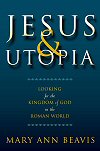
Scholarship on the historical Jesus and, now, on the “Jesus movement” generally divides into separate camps around two sticky questions: was Jesus an apocalyptic prophet and was the movement around him political, that is, nationalistic or revolutionary?
Mary Ann Beavis moves the study of the historical Jesus in a dramatic new direction as she highlights the context of ancient utopian thought and utopian communities, drawing particularly on the Essene community and Philo’s discussion of the Therapeutae, and argues that only ancient utopian thought accounts for the lack of explicit political echoes in Jesus’ message of the kingdom of God. The resulting portrait of Jesus, and of the basileia movement in which he participated, demonstrates that Jesus and his circle shared in the utopian impulses of their age.
Mary Ann Beavis locates Jesus’ teaching about the basileia of God in a richly drawn landscape of ancient utopian movements—illuminating indeed!
—Stephen J. Patterson, professor of New Testament, Eden Theological Seminary
Mary Ann Beavis is an associate professor of religious studies at St. Thomas More College, University of Saskatchewan, Saskatoon, and author of several books and articles in the fields of New Testament studies and urban studies. She was founding editor of The Journal of Religion and Popular Culture and The Canadian Journal of Urban Research.
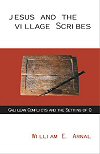
This volume challenges Gerd Theissen’s dominant thesis of “wandering radicals” as the earliest spreaders of the Jesus tradition. Several conclusions emerge: (1) the textual evidence for the “wandering radicals” hypothesis is not tenable and it must be replaced with one that more closely comports with the evidence: (2) the immediate context of the Jesus movement, and of Q in particular, is the socio-economic crisis in Galilee under the Romans; and (3) the formation of Q is the product of Galilean village scribes in the Jesus movement reacting to the negative developments in Galilee that affected their social standing.
Arnal moves decisively beyond earlier Q studies, which focused almost exclusively on literary history without dealing with the social realities of the first century.
Widely read recent interpreters have used the Harnack-Theissen construct of ‘itinerant charismatics’ to portray Jesus and his followers as innocuous Cynic-like ‘culture critics.’ In yet another devastating critique, William Arnal demonstrates that, in addition to being highly problematic as sociology, the ‘itinerant charismatics’ construct has no basis in ancient sources such as Q and the Didache.
—Richard Horsley, distinguished professor of liberal arts and the study of religion, University of Massachusetts
This important monograph builds on Kloppenborg’s Q-stratigraphy and examines the original material and ideological circumstances of the Synoptic Sayings Source. . . . Arnal’s noteworthy contribution deserves careful study by every student of Christian origins.
—Douglas E. Oakman, professor of religion, Pacific Lutheran University
William E. Arnal is an associate professor in the Department of Religious Studies at the University of Regina, Saskatchewan. He is coeditor of and contributor to Whose Historical Jesus?.
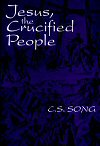
A deeply moving and challenging book, Jesus, the Crucified People breaks a theological stranglehold on the figure of Jesus and glimpses in a new, non-Western way both Jesus and Christianity.
Against the rich cultural background of Asia, Song’s volume explores the mystery of the Word that from the beginning of time now comes poignantly to us in the stories and testimonies of women, men, and children. Song eloquently fashions a “people hermeneutic” to sketch an account of Jesus’ life, ministry, death, and resurrection for our world today.
A powerful Asian Christology. The suffering of Asian women, men, and children struggling for life in the face of death confronts us with the passion of Christ in our neighbor.
—Letty M. Russell (1929–2007), assistant professor of theology, Yale Divinity School
C.S. Song groans, cries, shouts, protests, and argues passionately against the God who crucified Jesus among the people of Asia . . . This theology is a great leap from Western and Latin American liberation theologies.
—David Kwang-sun Suh, former dean, Ewha Woman’s University, Seoul
C.S. Song is an internationally influential voice in Christian theology and a pioneer of Asian Christian theology and story theology. He is the distinguished emeritus professor of theology and Asian cultures at the Pacific School of Religion and immediate past president of the World Alliance of Reformed Churches.
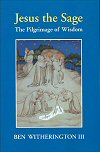
In the early Jesus movement, wisdom in the person of Jesus was believed to have returned to heaven, exalted to the right hand of God, and to reign from there. But Jesus as wisdom had left both his legacy and his influence behind. The sayings of Jesus recorded in the Gospels reflect not only the influence of the Israelite wisdom traditions, but also the tradition of the personification of wisdom.
In this provocative volume, Ben Witherington provides both an introduction to Israel’s wisdom traditions and insight into how Jesus and his sayings fit in that tradition. Beyond this, he demonstrates the ongoing significance and influence of these traditions on other New Testament writings. He concludes that Jesus may be viewed primarily as a prophetic sage emphasizing instruction, insight, and humor in a vein counter to the dominant culture.
Ben Witherington has written what is not only an extremely learned and fundamental book but one that is of theological importance as well. He offers much essential information on the sapiential background of ancient Jewish wisdom and the Jesus tradition that was influential in the shaping of earliest Christology. He corrects misguided opinions and leads us into the heart of the teachings of Jesus. He thereby contributes to our knowledge of earliest Christian thought, its Jewish background as well as its creative and innovative identity.
—Martin Hengel, emeritus professor of New Testament and Early Judaism, University of Tübingen
Ben Witherington III is professor of New Testament interpretation at Asbury Theological Seminary in Kentucky. He is the author of numerous works, including The Jesus Quest and New Testament History: A Narrative Account.
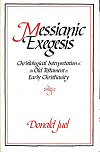
Professor Juel defends a simple thesis: “The beginnings of Christian reflection can be traced to interpretation of Israel’s Scriptures, and the major focus of that scriptural interpretation was Jesus, the crucified and risen Messiah.” He therefore proceeds to demonstrate how certain Old Testament texts came to be applied to Jesus as Christ. He argues that the interpretative application of such texts to Jesus was part of the interior logic of Christianity.
Professor Juel has given us a brilliant work of disciplined imagination . . . and for my part I detect a breath of fresh air . . . Professor Juel’s book makes an extremely valuable contribution not only to the study of how the earliest Christians interpreted the Hebrew Scriptures but also to our understanding of Christian origins.
—Journal of the American Academy of Religion
Though the relationship between Jewish modes of exegesis and the New Testament is recognized by everyone, few scholars actually succeed in illustrating that connection in intimate detail. Into the short and exclusive list of expert exegetes who can uncover the dynamic argument of a New Testament text, we must now put Donald Juel, whose new book Messianic Exegesis will certainly serve as a mode for how to investigate the problem of the use of the Old Testament in the New in the future.
—Word and World
Donald Juel (1942–2003) was the Richard J. Dearborn Professor of New Testament Theology at Princeton Seminary. Previously, he taught at Luther Seminary, (1978–1995), Princeton Seminary (1974–1978), and Indiana University (1972–1974).
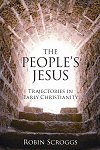
Seeking the patterns of thought that shaped early beliefs about Jesus as the Christ, the late Robin Scroggs explores the social settings that sparked the primary Christological themes and traces their trajectories through the literature that made up the New Testament.
Robin Scroggs’ The People’s Jesus asks one of the most crucial and strangely neglected questions for the study of the early Jesus movement: how did the vision and beliefs of the Jesus movement appeal to the ordinary believer and why did they find them meaningful? By tracing three trajectories—the identifications of Jesus as the Cosmocrator, as the apocalyptic judge, and as the miracle–working Christos—Scroggs is able to construct a conceptual map that encompasses the core vision of the documents of the New Testament. This volume is full of deep learning, balanced judgment, and an extraordinary effort to discern coherent structures permeating earliest Christianity.
—John S. Kloppenborg, professor, department of religion, University of Toronto
Robin Scroggs was the Edward Robinson Professor of Biblical Theology, Union Theological Seminary, New York. His books include Paul for a New Day, The New Testament and Homosexuality, Christology in Paul and John, and The Text and the Times: New Testament Essays for Today.
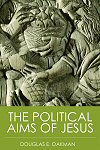
Amid competing portrayals of the “cynic Jesus,” the “peasant Jesus,” and the “apocalyptic Jesus,” the “political Jesus” remains a marginal figure. Douglas E. Oakman argues that advances in our social-scientific understanding of the political economy of Roman Galilee, as well as advances in the so-called “Third Quest” for the historical Jesus, warrant a revival—and a critical revision—of H.S. Reimarus’ understanding of Jesus as an instigator of revolutionary change.
Douglas Oakman is a demonstrated leader in the analysis of the economics, politics, and social conflicts of first-century Palestine. In this new work he pushes his political analysis even further, providing us with not only a fresh take on Jesus, but a fundamentally important one if one is to take seriously that Jesus was speaking (and acting) in ways that addressed the deepest concerns of his fellow Galileans and Judeans.
—K.C. Hanson, editor in chief, Wipf and Stock
Jesus the tax resister? An advocate of debt release—who allowed debtors to seize goods for subsistence? . . . Oakman challenges to the core the conveniently apolitical Jesus so tirelessly constructed and defended by Western interpreters.
—Richard Rohrbaugh, Emeritus Paul S. Wright Professor of Religious Studies, Lewis and Clark College
Douglas E. Oakman is professor of religion at Pacific Lutheran University and the author of Jesus and the Economic Questions of His Day and, with K.C. Hanson, Palestine in the Time of Jesus.
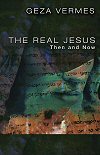
In The Real Jesus, Geza Vermes, best known for his work on the Dead Sea Scrolls and the Jesus of history, offers lucid and engaging presentations of his lifelong research, along with comments on a variety of contemporary religious themes, such as The Da Vinci Code, Mel Gibson’s controversial film The Passion of the Christ, Benedict XVI’s book Jesus of Nazareth, and the Gospel of Judas.
Informed by the work of a world-class scholar, the short articles in this book open to the reader the findings of some of the major discoveries of the twentieth century, such as the Dead Sea Scrolls, especially as they shed light on contemporary religious and biblical questions.
This collection of shorter popular pieces, many of which appeared in The Times of London and other newspapers, makes Vermes’ research on Christian origins, the Dead Sea Scrolls and most importantly Jesus the Jew accessible to everyone.
Geza Vermes is best known as a respected editor and translator of the Dead Sea Scrolls and as the author of a successful series of books on the historical Jesus. In these essays written for the popular press, he reveals himself as an astute and thoughtful cultural critic as well. He writes cogently and candidly on Mel Gibson, Dan Brown, Benedict XVI, the scandal of the delayed publication of the Dead Sea Scrolls, and, yes, the historical Jesus as well. Small bites, but each one nourishing.
—Luke Timothy Johnson, Robert W. Woodruff Professor of New Testament and Christian Origins, Candler School of Theology, Emory University
These elegant and humane essays will enlighten everyone interested in Jesus, the world in which he lived, and the modern efforts to portray him.
—E.P. Sanders, emeritus arts and sciences professor of religion, Duke University
Geza Vermes is emeritus fellow of the British Academy, and emeritus professor of Jewish studies and fellow of Wolfson College, Oxford University. He has been an international leader in the field of Dead Sea Scrolls research for more than 40 years, as recounted in his Providential Accidents: An Autobiography.
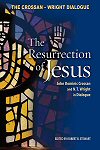
Two of today’s most important and popular New Testament scholars, John Dominic Crossan and N.T. Wright, here air their very different understandings of the historical reality and theological meaning of Jesus’ resurrection. The book highlights points of agreement and disagreement between them and explores the many attendant issues.
This book brings two leading lights in Jesus studies together for a long-overdue conversation with one another and with significant scholars from other disciplines.
The contributors include:
- John Dominic Crossan
- N.T. Wright
- Robert Stewart
- William Lane Craig
- Craig Evans
- R. Douglas Geivett
- Gary Habermas
- Ted Peters
- Charles Quarles
- Alan Segal
Robert B. Stewart is associate professor of philosophy and theology at New Orleans Baptist Theological Seminary, where he holds the Greer-Heard Chair of Faith and Culture and directs the annual Greer-Heard Point-Counterpoint Forum.
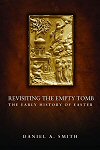
The Gospels disagree on what happened at the empty tomb, on who was there, and on what they saw or heard. The fact that our earliest written witness to the risen Christ, Paul, says nothing of the empty tomb has long provoked the question, what did early believers know about Easter, and when did they know it? Daniel A. Smith seeks to get behind the theological and apologetic concern to “prove” the resurrection and asks, where did the accounts of the early tomb come from, and what purpose did they originally serve? He shows that Paul is a valuable witness to the development of Easter traditions; that Q was already interested in connecting the disappearance of Jesus with his future role; that Mark was interested in the disappearance of Jesus, rather than in the empty tomb as such; and that both sources had interests different from the later Gospels. Chapters provide careful and insightful discussions of the earliest traditions about Jesus’ disappearance; in a conclusion Smith draws significant implications for a theory of Christian origins.
Smith has given us a carefully reasoned and original piece of scholarship that allows us to think about some old issues from new points of view. The fresh approach to Q and Jesus’ vindication is particularly suggestive. A solid contribution to a perennially fascinating topic.
—Dale C. Allison Jr., Erret M. Gragle Professor of New Testament, Pittsburg Theological Seminary
In Revisiting the Empty Tomb, Daniel Smith advances a thesis that makes sense of several puzzles that have plagued scholarship on the resurrection account. On his showing, the empty tomb story is not, as many had thought, fabricated as a deduction from the announcement of the resurrection of Jesus. Instead it belongs to a different complex of representations of the vindication of Jesus—the belief that he, like Elijah, Enoch, and other heroes was assumed and was therefore ‘not seen.’ Smith’s important and lucidly argued work promises to help sort out many of the complexities of the accounts of Jesus’ post-mortem vindication. A ‘must read’ for anyone concerned with the beliefs of the earliest Jesus-movement.
—John S. Kloppenborg, professor, department of religion, University of Toronto
Daniel A. Smith is associate professor of New Testament theology at Huron University College, and the author of a number of scholarly articles on the Gospels and early Christianity.
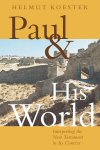
This volume presents critical essays on theology and eschatology in Paul’s letters, the apostle’s religious and cultural context, and the interaction of early Christianity with its Greco-Roman environment, as reflected in ancient literature and archaeological remains.
Helmut Koester is John H. Morison Research Professor of Divinity and Winn Research Professor of Ecclesiastical History at Harvard Divinity School in Cambridge, Massachusetts, and chair of the New Testament Board of the Hermeneia Commentary Series.
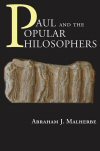
These studies continue a tradition of scholarship that flourished around the turn of the century when new editions of ancient philosophical sources were published. Professor Malherbe, however, widens the scope to include other philosophical traditions. He recognizes and identifies the influences of Platonists, Peripatetics, Cynics, Stoics, Epicureans, and Pythagoreans. These popular philosophers aimed at moral reform; they shared both in their substance and in the techniques employed. Yet, they need to be distinguished in order to discern their influence, if any, on Paul.
Abraham J. Malherbe is Buckingham Professor of New Testament Criticism and Interpretation, emeritus, at Yale University, The Divinity School, New Haven, Connecticut.
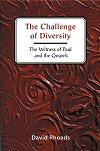
This volume is addressed primarily to Christians of various denominations in the United States—to parishes, both laity and clergy, and to students. The book is useful in teaching, preaching, spiritual formation, and mission. Its aim is simply to be a source of Christian renewal at both the personal and the parish levels as together we seek to minister to one another and to the world. It is an invitation to reach beyond our own perspective and to embrace a wider circle of diverse viewpoints as legitimate expressions of the Christian life—both in the New Testament and in the contemporary church—and to be open to learn and grow from them.
This book is an excellent introduction to the major ways of being Christian in the New Testament. David Rhoads brings out the richness and diversity of the New Testament in such a way as to help us understand and welcome the richness and diversity in our churches and culture today. The book is both a good introduction to New Testament thought and to ways in which that thought may be meaningful in our own context.
—Joanna Dewey, Harvey H. Guthrie Jr. Professor Emerita of Biblical Studies, Episcopal Divinity School
I love this book! It is an excellent guide for those who wish to draw on the rich resources of Scripture for varieties of mission and ministry in the contemporary world. Students and congregations, clergy and laity, will find that this volume enhances understanding of their own diversity and appreciation for the diversity of others.
—Mark Allan Powell, Robert and Phyllis Leatherman Professor of New Testament, Trinity Lutheran Seminary
The essential point of the Challenge of Diversity is that appreciation of the diversity in Scripture and in the early church is a source of renewal in the church today. . . . The book’s principal strength is its case that church renewal must be grounded in Scripture and that diverse perspectives of particular writings must be honored. In this way Rhoads offers a welcome corrective to reductionist tendencies that gloss over theological and relational tensions within and between biblical books. . . . Rhoads offers a timely and constructive contribution for engaging the challenge of diversity, and those seeking fruitful discussion on this topic will not be disappointed.
—Interpretation
Rhoads’ style is clear and accessible, and his passion for the renewal of the church comes through on every page. This book will prove stimulating reading for pastors, seminarians, and lay persons who are concerned to draw upon the rich resources of the Bible in revitalizing the life and mission of a diverse church in a pluralistic world.
—Princeton Seminary Bulletin
I highly recommend this book for both lay and minister readers and for personal and group study. My first year seminarians in my introductory Gospels course loved it! It evoked lively discussion, helped us experience the Gospels anew, and deepened our appreciation of the profundity and contemporary relevance of diverse New Testament witnesses. It is a book that can help all of us understand and embrace the diversity that is God’s gift to the church and essential to effective mission and ministry.
—The Presbyterian Outlook
David Rhoads is emeritus professor of New Testament at Lutheran School of Theology in Chicago and the author of Reading Mark: Engaging the Gospel, editor of From Every People and Nation: The Book of Revelation in Intercultural Perspective, and coeditor of The Season of Creation: A Preaching Commentary.
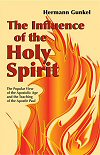
This little book, the first by Hermann Gunkel, shattered the reigning images of the New Testament idea of the Spirit. Gunkel’s argument not only revolutionized the theology of his time but has continued to be foundational for most subsequent studies on the subject. As he did in so much of his work, Gunkel not only explores the milieu of the New Testament but also demonstrates the dependence of the biblical message upon its religious environment.
Hermann Gunkel (late professor of Old Testament at the university in Berlin, Giessen, and Halle, Germany) is one of the most important figures in the history of Old Testament research. He is best known as the founding figure of form criticism and as a member of the History of Religion School.

A sharp challenge to traditional ways of understanding Paul is sounded in this book by a distinguished interpreter of the New Testament. Krister Stendahl proposes—in the key title essay—new ways of exploring Paul’s speech: Paul must be heard as one who speaks of his call rather than conversion, of justification rather than forgiveness, or weakness rather than sin, of love rather than integrity, and in unique rather than universal language.
The title essay is complemented by the landmark paper, “Paul and the Introspective Conscience of the West,” and by two seminal explorations of Pauline issues: “Judgment and Mercy” and “Glossolalia—The New Testament Evidence.” The book concludes with Stendahl’s pointed reply to the eminent scholar Ernst Kasemann who has taken issue with the author’s revolutionary interpretations. This volume provides convincingly new ways for viewing Paul, the most formative of Christian teachers.
An especially important book . . . for all who are interested in the alleged biblical roots of Christian anti-Semitism.
—Worldview
Krister Stendahl (1921–2008) was Andrew W. Mellon Professor of Divinity Emeritus and former dean at Harvard Divinity School, and bishop emeritus of Stockholm. Among his many writings is Final Account: Paul’s Letter to the Romans.
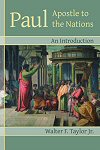
Seemingly from the start, the Apostle Paul has been one of Christianity’s most important—and controversial—figures. In this carefully designed textbook, Walter F. Taylor Jr. sets the apostle in his cultural world, examining his work, his letters, and his legacy in the light of the latest scholarly methods. Paul’s thought never stands alone; careful attention is given to social realities and controversies in Paul’s churches and to rhetorical aspects of his letters. Frequent sidebars illustrate points or offer additional depth; maps, a timeline, and photographs bring the world around Paul to life. Each chapter includes study questions and recommendations for further reading. A glossary of terms and bibliography help the beginning and the advanced student alike.
Professor Taylor has provided a clearly written and highly informative account of Paul’s life, his world, and his letters. The presentation is well organized, comprehensive, and insightful, making the apostle and his work accessible to the reader. The book can be recommended highly for students and others who want a reliable guide to one of the most important figures and collections of New Testament writings at the dawn of Christian origins.
—Arland J. Hultgren, emeritus professor, Luther Seminary, St. Paul, MN
This extremely well-written study combines an effective exposition of Paul’s identity with an effective exposition of Paul’s seven undisputed letters. Professor Taylor is remarkably sensitive to the Roman imperial context of Paul’s ministry and the impact of Paul’s Roman chains upon his letters to the Philippians and to Philemon.
—Richard J. Cassidy, professor of sacred Scripture, Sacred Heart Major Seminary, Detroit, MI
Walter F. Taylor Jr. is the Ernest W. and Edith S. Ogram Professor of New Testament Studies at Trinity Lutheran Seminary and a member of the Context Group, applying social-science models to the study of the New Testament. He is the author of numerous journal articles on the New Testament and of Ephesians, and study resources on Galatians and Romans.
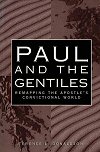
In this first major analysis of Paul’s understanding of Gentile salvation in several years, Terence Donaldson offers a creative approach to the major themes of the apostle’s theological convictions: God, sin, the Torah, Christ, Israel, his own call, and others. According to Donaldson, Paul as a believer in Jesus Christ did not abandon his Jewish frame of reference but reconfigured it, especially by the stimulus of his mission to the Gentiles.
Not since E. P. Sander’s Paul and Palestinian Judaism has there been such a sustained effort to understand Paul by locating him in his native religion, late Second Temple Judaism. Donaldson constructs Paul’s context by looking particularly at ancient evidence, both scriptural and social, as it pertains to Jewish views of and interactions with Gentiles. The result is a breathtakingly ambitious survey and analysis of Jewish thought on ‘the Gentile questions,’ combined with a close reading of the epistles and, consequently, a coherent and plausible reconstruction of Paul’s mission and motives. In this book, Terry Donaldson brings together ancient and modern sources with imagination and conviction to advance his own original hypothesis explaining how this ‘Hebrew of Hebrew’ came to see the incorporation of Gentiles as the logical extension of his commitment to Christ and to the redemption of Israel.
—Paula Fredriksen, William Goodwin Aurelio Chair Emerita of the Appreciation of Scripture, Boston University
Terence Donaldson has pursued one specific question with such methodological rigor as to cast light on many aspects of Paul’s convictions, theology, and rhetorical stance in general. This is an important book.
—Lloyd Gaston, emeritus professor of New Testament, Vancouver School of Theology
Donaldson interacts honestly and incisively with the main lines of thinking that are now current and offers a new dimension of thought that has not yet been presented.
—Scot McKnight, Karl A. Olsson Professor in Religious Studies, North Park University
Terence L. Donaldson is Lord and Lady Coggan Professor of New Testament Studies at Wycliffe College. He is the author of Jesus on the Mountain: A Study in Matthean Theology and Jews and Anti-Judaism in the New Testament.
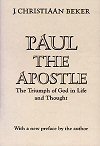
This volume posits two pillars as the foundations of Paul’s thought: one, the interaction between coherence and contingency in Paul’s interpretation of the Gospel, and two, the apocalyptic character of his Gospel.
This theological construction is so imposing that it is likely to become the lightning rod for the next phase of scholarly storms. . . . Both in opening up new solutions to knotty interpretive problems, Paul the Apostle is a major achievement. It should be on the ‘must-read’ list for every serious devotee of the New Testament.
—Theology Today
. . . a full-dress study of Paul’s thought, characterized by comprehensiveness, exegetical discipline, theological penetration, and a passion for a responsible contemporary hermeneutic. . . . It will grace our Pauline shelves for a very long time, not least because readers will sense that the theological passions that raged in the heart and mind of Paul incite a contagious resonance in the heart and mind of the distinguished author.
—Word and World
This book is a serious proposal by a mature scholar. Its specificity will drive others to investigate the breadth of learning it presumes. Its theological concern is candidly accessible on the grounds of historical and exegetical inquiry. It is a welcome contribution to New Testament interpretation.
—Catholic Biblical Quarterly
J. Christiaan Beker was, for 30 years, the Richard J. Dearborn Professor of New Testament Theology at Princeton Theological Seminary; he died in 1999. Among his books are The Triumph of God and The New Testament: A Thematic Introduction.
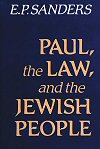
This book is devoted both to the problem of Paul’s view of the Law as a whole, and to his thought about and relation to his fellow Jews. Building upon his previous study, the critically acclaimed Paul and Palestinian Judaism, E.P. Sanders explores Paul’s Jewishness by concentrating on his overall relationship to Jewish tradition and thought. Sanders addresses such topics as Paul’s use of Scripture, the degree to which he was a practicing Jew during his career as apostle to the Gentiles, and his thoughts about his “kin by race” who did not accept Jesus as the Messiah. In short, Paul’s thoughts about the Law and his own people are re-examined with new awareness and great care.
Sanders addresses an important chapter in the history of the emergence of Christianity. Paul’s role in that development—especially in light of Galatians and Romans—is now re-evaluated in a major way. This book is in fact a significant contribution to the study of the emergent normative self-definition in Judaism and Christianity during the first centuries of the Common Era.
E.P. Sanders is emeritus arts and sciences professor of religion at Duke University, Durham, North Carolina. He is the author of Jesus and Judaism, winner of the 1990 Louisville Grawemeyer Award in Religion. Paul and Palestinian Judaism received the 1978 National Religious Book Award, Scholarly Book Category, from Religious Book Review.
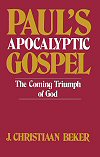
In this bold sequel to Paul the Apostle, celebrated New Testament scholar J. Christiaan Beker reclaimed the apocalyptic center of Paul’s proclamation for the life of the contemporary church.
J. Christiaan Beker faces a major question: can the genuine power of Paul’s truly responsible apocalyptic be recovered in our time—so that we are actually addressed by the gospel of God’s coming cosmic triumph—without falling victim to readily available forms of sheer speculation, paranoid polarization, and romantic futurism? Beker responds to this question with uncommon honesty and insight as he shows that the passion for God’s coming triumph can serve—and in fact does serve—as the generating source of our compassion for our needy world.
—J. Louis Martyn, Edward Robinson Professor Emeritus of Biblical Theology, Union Theological Seminary
The great Christian word hope has fallen on hard times: existential theologians have redefined it as openness to a vague future; Apocalyptic sensationalists have reduced it to a time table of escapism. In his study of Paul’s Apocalyptic Gospel, Beker has recaptured the meaning of hope. To a church fettered to her past or consumed by her present, no perspective is more helpful than Beker’s conclusion that the Gospel embraces the future and that the future’s clearest feature is the victory of God. Preaching will come to life and Bible study take on new vigor for all who walk through Paul’s letters with Beker as a guide.
—David Allan Hubbard, former president, Fuller Theological Seminary
J. Christiaan Beker was, for 30 years, the Richard J. Dearborn Professor of New Testament Theology at Princeton Theological Seminary; he died in 1999. Among his books are the critically acclaimed Paul the Apostle, The Triumph of God, and The New Testament: A Thematic Introduction.
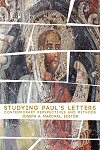
Studying Paul’s Letters provides a survey of the most relevant current methods in Pauline scholarship. Joseph A. Marchal leads a group of scholars who are also experienced teachers in courses on Paul. More than a series of “how-to” essays in interpretation, each chapter in this volume shows how differences in starting point and interpretive decisions shape different ways of understanding Paul. Each teacher-scholar focuses on what a particular method brings to interpretation and applies that method to a text in Paul’s letters, aiming not just at the beginning student but at the “tough choices” every teacher must make in balancing information with critical reflection. Studying Paul’s Letters is organized for use in a single semester course on Paul and is perfect for graduate students, seminarians, and undergraduate students.
The essays in Studying Paul’s Letters, each written by a first-tier scholar, manage to demonstrate cutting-edge Pauline scholarship in ways that remain highly accessible for beginning students. These essays will not only provoke conversation about difference in perspective, but also reveal the multiple ways that seemingly disparate approaches still often intertwine. I can think of no other collection suitable as supplementary readings for students that so effectively unites these various goals.
—Robert Paul Seesengood, assistant professor of religious studies, Albright College
Pauline studies, long the most methodologically monolithic and theologically timid area of New Testament studies, bursts out of its shell with this textbook. I feel I’ve been waiting for it for a very long time.
—Stephen D. Moore, professor of New Testament, Drew Theological School
This is arguably the best and most accessible textbook for a course on reading Paul. This book will help readers learn not only about Paul in particular but also how one might approach the New Testament in general. The latter aspect is especially helpful since it focuses on approaches that are still seldom covered in most textbooks on biblical criticism, like reading from a spatial and a visual perspective. Most importantly, contributors to this volume write as teachers as well as researchers. I will no doubt adopt this book for my next course on Paul.
—Tat-siong Benny Liew, professor of New Testament, Pacific School of Religion
This introduction to Paul’s letters is a surprisingly readable entrée into a spectrum of ideological approaches to interpreting biblical texts. Foregrounding accountability for the results of our engagement with Scripture, each chapter in turn offers a substantive engagement with and challenge to more traditional methods of reading Paul. Perhaps more importantly, any given chapter simultaneously highlights the highly political nature not only of Paul’s letters but also of our interpretations of them. A course on Paul today, whether for the undergraduate or seminary level, would be woefully lacking without this text.
—Jennifer Bird, associate professor of religion, Greensboro College
Joseph A. Marchal is associate professor of religious studies in the department of philosophy and religious studies at Ball State University and the author of The Politics of Heaven: Women, Gender, and Empire in the Study of Paul and a number of journal articles and essays concerning method and approach in interpretation.
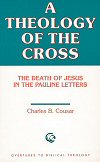
In Paul’s epistles the crucifixion story reveals a God who is free and in no way bound by human categories or expectations. Yet God in Christ chooses to be engaged in the very depths of the human predicament. The message of the crucifixion is that God’s power is manifested in weakness, not in strength. The author believes that this “weakness as strength” should be the focal point of the church’s identity. However, a celebration of weakness is in complete opposition to traditional American beliefs in personal strength and a powerful church.
Charles Cousar’s A Theology of the Cross moves gracefully between critical exegesis and theological reflection. Deftly expositing Paul’s interpretation of the cross and resurrection, Cousar corrects the polemical imbalance of Kasemann’s treatment while updating its insights about the urgency of the word of the cross for the church today. Cousar’s discerning work is a splendid achievement: at once deeply conversant with cutting-edge technical scholarship and written with great lucidity for the nonspecialist, it illumines Paul’s message in a way that will prove especially valuable for pastors and students. I know of no other work that so helpfully synthesizes important recent developments in the study of Pauline theology.
—Richard B. Hays, George Washington Ivey Professor New Testament, Suke Divinity School
Charles B. Cousar is Emeritus Samuel A. Cartledge Professor of New Testament at Columbia Theological Seminary, Decatur, Georgia.
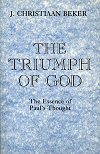
This book posits two pillars as the foundations of Paul’s thought: one, the interaction between coherence and contingency in Paul’s interpretation of the gospel, and two, the apocalyptic character of his Gospel. The author ventures to demonstrate how Paul’s interpretation of the Gospel as coherent is integral with Paul’s communication of the Gospel as situationally contingent. These ostensibly opposing perspectives actually combine to form a fluid Pauline hermeneutic. The centrality of Christological apocalyptic in Paul’s interpretation is posited and involves a radical shift in traditional conceptions of Paul’s theology. The author is “recasting Paul’s theology as a theocentric theology of hope rather than as a Christocentric salvation-history (O. Cullmann) or as an existentialist theology of the cross (R. Bultmann). A theology of hope views the present as the dawn of the future and the future as the full actualization of the present.” Examining the implications of this approach—the ultimacy of God’s sovereignty and triumph beside the Christ-event, the formation of a “biblical-theology,” a rethinking of traditional concepts of salvation and ethics—the author intends to reveal a fresh and most enlightening view of Paul’s theology.
The Triumph of God is a book for which we have long been waiting. In it Beker, one of today’s leading interpreters of Paul, makes available to a wide readership the central tenets of his bold and much-discussed approach to Paul. Beker’s thesis is that, for Paul, the Christ-event is proleptic of the coming, cosmic triumph of God. Categorically, Beker takes issue with any construal of Paul that downplays the theocentric, cosmic, or future aspects of the apostle’s apocalyptic gospel. Challenging and controversial, this slim volume is ideal for classroom use. Pastors, teachers, and students will read it with interest and be nudged to see Paul’s ancient writings in new perspective.
—Jack Dean Kingsbury, emeritus professor, Union Theological Seminary, VA
J. Christiaan Beker was, for 30 years, the Richard J. Dearborn Professor of New Testament Theology at Princeton Theological Seminary; he died in 1999. Among his books are the critically acclaimed Paul the Apostle and The New Testament: A Thematic Introduction.
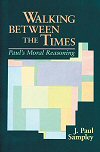
Two times govern Paul’s thought world: the death and resurrection of Jesus, marking the origin of the believer’s life; and Christ’s return or parousia, culminating God’s purposes with this world. Between these two times Paul is concerned about how believers behave—how they walk. J. Paul Sampley provides a guidebook for all who want to understand Paul’s thought world, his moral reasoning, and the resources for deliberation that Paul considers available to believers.
Walking between the Times rescues Paul from his ‘Lutheran captivity’ by emphasizing his eschatology as his frame of ethical reflection. Sampley’s work is one more notable contribution to our reclaiming of Paul for helping Christians to live ‘between the times.’
—Stanley M. Hauerwas, Gilbert T. Rowe Professor of Theological Ethics, Duke University
Sampley offers a clear and easily understood exposition of Paul’s ethic, taking account of a widely accepted consensus about living between the old age and the new. It is the most accessible treatment of the issues currently available and should receive a wide readership.
—Robert Jewett, visiting professor of New Testament, University of Heidelberg
J. Paul Sampley has provided a simple and attractive map of a complicated terrain: Paul’s moral reasoning. Pastors, laypeople, and students will be surprised to discover a fresh way of reflecting on moral issues in texts they thought were all too familiar.
—Wayne A. Meeks, Woolsey Professor Emeritus of Biblical Studies, Yale University
J. Paul Sampley is emeritus professor of New Testament, School of Theology, Boston University.
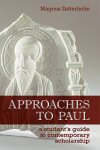
What distinguishes the “new perspective on Paul”—and what lies beyond it? What are scholars saying about Paul and the Roman Empire or about the intersection between feminist and postcolonial interpretation of Paul? Magnus Zetterholm provides a clear and reliable guide to these and other lively issues in the contemporary study of Paul, surveying the history of the principal perspectives on Paul’s relation to Judaism and the Jewish law and showing the relationships between answers given to those questions and the assumptions scholars bring to other issues as well. This is an indispensable handbook for the beginning student of the apostle and his thought.
Magnus Zetterholm is associate professor of New Testament studies at Lund University, Sweden.
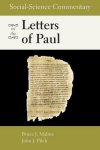
This latest addition to the Fortress Social-Science Commentaries on New Testament writings illuminates the values, perceptions, and social codes of the Mediterranean culture that shaped Paul and his interactions—both harmonious and conflicted—with others. Malina and Pilch add new dimensions to our understanding of the apostle as a social change agent, his coworkers as innovators, and his gospel as an assertion of the honor of the God of Israel.
Bruce J. Malina is professor of New Testament at Creighton University, Omaha, Nebraska.
John J. Pilch is professor of biblical studies at Georgetown University, Washington, DC.
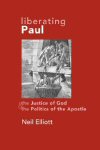
For centuries the apostle Paul has been invoked to justify oppression—whether on behalf of slavery, to enforce unquestioned obedience to the state, to silence women, or to legitimate anti-Semitism. To interpret Paul is thus to set foot on a terrible battleground between spiritual forces. But as Neil Elliott argues, the struggle to liberate human beings from the power of Death requires “Liberating Paul” from his enthrallment to that power. In this book, Elliott shows that what many people experience as the scandal of Paul is the unfortunate consequence of the way Paul has usually been read, or rather misread, in the churches.
In the first half of the book, Elliott examines the many texts historically interpreted to support oppression or maintain the status quo. He shows how often Paul’s authentic message has been interpreted in the light of later pseudo-Pauline writings.
In part two, Elliott applies a “political key” to the interpretation of Paul. Though subsequent centuries have turned the cross into a symbol of Christian piety, Elliott forcefully reminds us that in Paul’s time this was the Roman mode of executing rebellious slaves, a fact that has profound political implications.
Under Elliott’s examination, a startlingly new image of Paul begins to emerge, liberated from layers of false interpretation, and free to speak a liberating and challenging word to our world today.
Neil Elliott, an Episcopal priest, teaches biblical studies at United Theological Seminary of the Twin Cities and Metropolitan State University in Minneapolis.
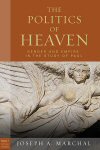
In this provocative study, Joseph A. Marchal argues that biblical interpretation, but most especially Pauline studies, must engage the full range of critical challenges brought by feminist studies, postcolonial studies, and Roman imperial studies. A feminist, postcolonial analysis requires negotiating the gaps, overlaps, and tensions between these three “strands” by adopting an explicitly multiaxial focus and an interdisciplinary methodology. Using Philippians as a test case, the analysis covers issues of both ancient and contemporary import: from imitation and authority to travel and contact. As a result, Marchal provides strikingly new perspectives on Paul’s letters and fresh challenges to the paradigms of Pauline interpretation.
Joseph A. Marchal is assistant professor of religious studies at Grinnell College and the author of numerous articles and papers in feminist and postcolonial interpretation.
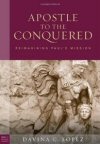
Davina C. Lopez here combines attention to Roman visual and literary representations of conquered nations with a gender-critical “reimagination” of Paul’s apostleship. The result is a new and more critical perspective on the systematic violence of the Roman Empire, and a renewed understanding of “Paul’s politics of the new creation.”
Davina C. Lopez is assistant professor of religious studies at Eckerd College in St. Petersburg, Florida, and serves on the American Academy of Religion’s Board of Directors.
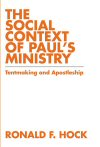
Ronald Hock focuses on the apostle Paul and his work within the social and intellectual context of the Greek East of the early Roman Empire. He discusses the New Testament evidence concerning tentmaking in relation to Paul’s life as an apostle of Christ. Relevant literary and nonliterary texts from outside the New Testament add detail to a picture of ancient society and open new areas for study. The author describes the typical experiences that arose from such a way of life–traveling, the tentmaking trade, the missionary use of the workshop, attitudes toward work, and Paul’s own reflections on the significance of his tentmaking for the apostolic self-understanding.
Ronald F. Hock is professor of religion at the University of Southern California, Los Angeles.
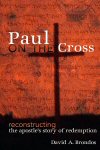
Even as theologians have become more critical of classic theories of atonement, biblical scholars have continued to rely upon such theories as a basis for interpreting Paul’s teaching regarding salvation and the cross. In this vital volume, Brondos looks to the recent advances in New Testament scholarship to argue for an alternative understanding of Paul’s doctrine of salvation and the cross.
Paul, says Brondos, understood Jesus’ death primarily as the consequence of his mission: to serve as God’s instrument to bring about the long-awaited redemption of Israel, in which Gentiles throughout the world would also be included. For Paul, Jesus’ death is salvific not because it satisfies some necessary condition for human salvation, as most doctrines of the atonement have traditionally maintained, nor because it effects some change in the situation of human beings or the world in general. Rather, Jesus’ God responded to Jesus’ faithfulness unto death by raising him, thereby ensuring that all the divine promises of salvation would be fulfilled through him.
Jesus’ death forms part of an overarching story culminating in the redemption of Israel and the world. It is this story, and in particular what preceded and followed Jesus’ death on the cross, that makes that death redemptive for Paul.
David Brondos is professor of theology at the Theological Community of Mexico, an ecumenical consortium of seminaries in Mexico City, where he teaches systematic theology and biblical studies.
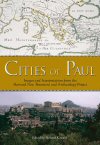
Cities of Paul, Images and Interpretations: from the Harvard New Testament and Archaeology Project
- Author: Helmut Koester
- Publisher: Fortress Press
- Publication Date: 2004
- Pages: 871
This dynamic resource includes nine hundred photographs from sites in Greece and Turkey (ancient Asia Minor) illuminating the religious and civic lives of peoples encountered by Paul and other leaders in the earliest churches. Cities featured include Athens, Olympia, Corinth, Pergamon, Delphi, Philippi, Ephesus, and Thessalonike. In addition to photos, this resource includes maps, bibliographies, and detailed historical information about the sites and artifacts.
Each slide is accompanied by an explanation of the image and the particular elements in the photograph. This stunning array of images and commentary is a powerful teaching and reference tool to bring alive the world of the early Christians for students and laypersons alike.
Helmut Koester is John H. Morison Research Professor of Divinity and Winn Research Professor of Ecclesiastical History at Harvard Divinity School in Cambridge, Massachusetts, and chair of the New Testament Board of the Hermeneia Commentary Series.
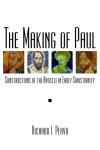
The Making of Paul: Constructions of the Apostle in Early Christianity
- Author: Richard I. Pervo
- Publisher: Fortress Press
- Publication Date: 2010
- Pages: 400
The influence of the apostle Paul in early Christianity goes far beyond the reach of the seven genuine letters he wrote to early assemblies. Paul was revered–and fiercely opposed–in an even larger number of letters penned in his name, and in narratives told about him and against him, that were included in our New Testament and, far more often, treasured and circulated outside it. Richard Pervo provides an illuminating and comprehensive survey of the legacy of Paul and the various ways he was remembered, honored, and vilified in the early churches. Numerous charts and maps introduce the student to the “family” of Pauline and anti-Pauline Christianities.
Richard I. Pervo, retired professor of New Testament and Christian studies at the University of Minnesota, is author of Rethinking the Unity of Luke and Acts, and most recently, Dating Acts: Between the Evangelists and the Apologists.
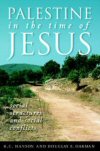
Palestine in the Time of Jesus: Social Structures and Social Conflicts
- Authors: K.C. Hanson and Douglas E. Oakman
- Publisher: Fortress Press
- Publication Date: 2002
- Pages: 256
Hanson and Oakman’s award-winning and illuminating volume has become a widely used and cited introduction to the social context of the early Jesus movement. Along with an overview of the ancient Mediterranean worldview, it explores major domains and institutions of Roman Palestine: kinship, politics, economy, and religion.
Through a judicious use of the social sciences, Hanson and Oakman’s enormously helpful volume explains in a readable way the primary social institutions and structures of ancient Palestine, with a view to how they are reflected in and shaped the early Jesus movement.
After an overview of social analysis and of the ancient Mediterranean worldview, the core of the book systematically presents major domains and institutions of family, politics, and economy, always with reference to specific biblical and other ancient texts. In a concluding chapter, the authors explore Palestine’s religious institutions, especially Herod’s Temple systems and Jesus’ relation to it.
From the preface:
We have the following general goals in mind through our work:
- To examine the primary social institutions of first-century Palestine through a social-scientific methodology
- To present testable models of society that can be employed when studying the Bible, and therefore be refined or modified as the reader acquires more information
- To relate the systemic analysis directly to New Testament passages in each chapter in order to demonstrate how this material is applicable
K.C. Hanson and Doug Oakman are terrific cross-cultural guides to first-century Palestine—its kinship patterns, political power, economic configurations, and religious dynamics. Their book sparkles with insights illuminating life in ancient Israel and the teachings of Jesus...
—David Rhoads, Professor of New Testament, Lutheran School of Theology, Chicago, Illinois
K.C. Hanson has taught biblical studies at Episcopal Theological School and the School of Theology at Claremont, Creighton University, and St. Olaf College. He is the author of numerous scholarly articles and two volumes in the Proclamation series. K.C. Hanson is the biblical studies editor at Fortress Press.
Douglas E. Oakman is Professor of Religion at Pacific Lutheran University in Tacoma, Washington. He is the author of Jesus and the Economic Questions of His Day.
Reviews
1 rating

Rev. Robert Sundquist
9/20/2018
Peter Llewellyn
5/5/2014
I know many of these books, own a few in hard copy, have reviewed some and have wanted to read others. This is an awesome collection by one of the best theological publishers in the English language. It is a scholarly collection, not for random dipping, as each is a monograph by a leading scholar on a wide variety of topics in New Testament studies. Consequently we only get one side of many of the debates - opposing positions are usually published by somebody else. Nor does this collection conform to a single point of view or basic theological perspective. There are degrees of orthodoxy and some way-out perspectives; to have Tannehill, Malina, Beker, Kingsbury and Koester - to name a few - in the same collection is truly wonderful. Logos is to be commended for putting this package together; all I need now is the money to buy it.